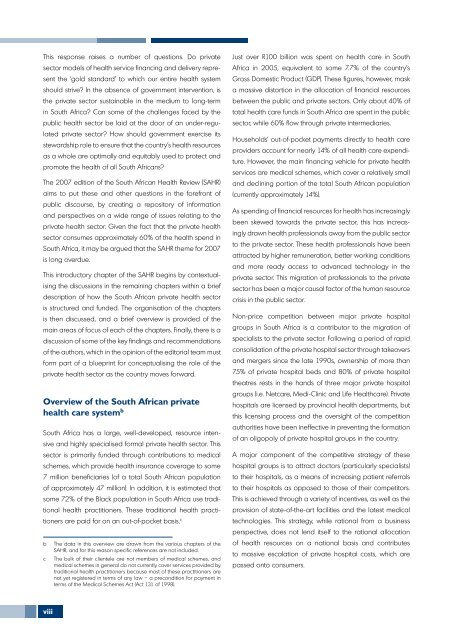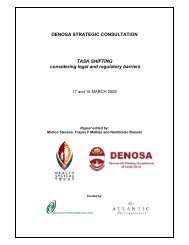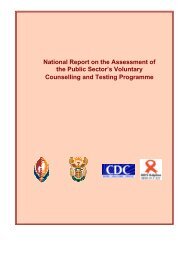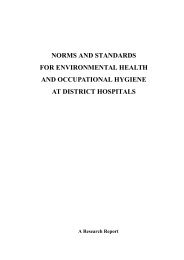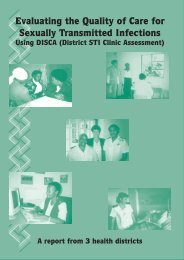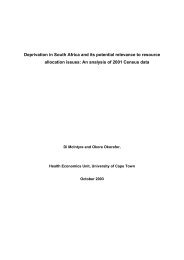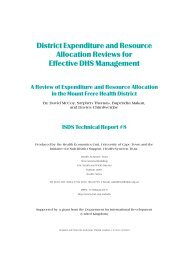SAHR 2007 - Health Systems Trust
SAHR 2007 - Health Systems Trust
SAHR 2007 - Health Systems Trust
You also want an ePaper? Increase the reach of your titles
YUMPU automatically turns print PDFs into web optimized ePapers that Google loves.
This response raises a number of questions. Do private<br />
sector models of health service financing and delivery represent<br />
the ‘gold standard’ to which our entire health system<br />
should strive? In the absence of government intervention, is<br />
the private sector sustainable in the medium to long-term<br />
in South Africa? Can some of the challenges faced by the<br />
public health sector be laid at the door of an under-regulated<br />
private sector? How should government exercise its<br />
stewardship role to ensure that the country’s health resources<br />
as a whole are optimally and equitably used to protect and<br />
promote the health of all South Africans?<br />
The <strong>2007</strong> edition of the South African <strong>Health</strong> Review (<strong>SAHR</strong>)<br />
aims to put these and other questions in the forefront of<br />
public discourse, by creating a repository of information<br />
and perspectives on a wide range of issues relating to the<br />
private health sector. Given the fact that the private health<br />
sector consumes approximately 60% of the health spend in<br />
South Africa, it may be argued that the <strong>SAHR</strong> theme for <strong>2007</strong><br />
is long overdue.<br />
This introductory chapter of the <strong>SAHR</strong> begins by contextualising<br />
the discussions in the remaining chapters within a brief<br />
description of how the South African private health sector<br />
is structured and funded. The organisation of the chapters<br />
is then discussed, and a brief overview is provided of the<br />
main areas of focus of each of the chapters. Finally, there is a<br />
discussion of some of the key findings and recommendations<br />
of the authors, which in the opinion of the editorial team must<br />
form part of a blueprint for conceptualising the role of the<br />
private health sector as the country moves forward.<br />
Overview of the South African private<br />
health care system <br />
South Africa has a large, well-developed, resource intensive<br />
and highly specialised formal private health sector. This<br />
sector is primarily funded through contributions to medical<br />
schemes, which provide health insurance coverage to some<br />
7 million beneficiaries (of a total South African population<br />
of approximately 47 million). In addition, it is estimated that<br />
some 72% of the Black population in South Africa use traditional<br />
health practitioners. These traditional health practitioners<br />
are paid for on an out-of-pocket basis. <br />
<br />
<br />
The data in this overview are drawn from the various chapters of the<br />
<strong>SAHR</strong>, and for this reason specific references are not included.<br />
The bulk of their clientele are not members of medical schemes, and<br />
medical schemes in general do not currently cover services provided by<br />
traditional health practitioners because most of these practitioners are<br />
not yet registered in terms of any law – a precondition for payment in<br />
terms of the Medical Schemes Act (Act 131 of 1998).<br />
Just over R100 billion was spent on health care in South<br />
Africa in 2005, equivalent to some 7.7% of the country’s<br />
Gross Domestic Product (GDP). These figures, however, mask<br />
a massive distortion in the allocation of financial resources<br />
between the public and private sectors. Only about 40% of<br />
total health care funds in South Africa are spent in the public<br />
sector, while 60% flow through private intermediaries.<br />
Households’ out-of-pocket payments directly to health care<br />
providers account for nearly 14% of all health care expenditure.<br />
However, the main financing vehicle for private health<br />
services are medical schemes, which cover a relatively small<br />
and declining portion of the total South African population<br />
(currently approximately 14%).<br />
As spending of financial resources for health has increasingly<br />
been skewed towards the private sector, this has increasingly<br />
drawn health professionals away from the public sector<br />
to the private sector. These health professionals have been<br />
attracted by higher remuneration, better working conditions<br />
and more ready access to advanced technology in the<br />
private sector. This migration of professionals to the private<br />
sector has been a major causal factor of the human resource<br />
crisis in the public sector.<br />
Non-price competition between major private hospital<br />
groups in South Africa is a contributor to the migration of<br />
specialists to the private sector. Following a period of rapid<br />
consolidation of the private hospital sector through takeovers<br />
and mergers since the late 1990s, ownership of more than<br />
75% of private hospital beds and 80% of private hospital<br />
theatres rests in the hands of three major private hospital<br />
groups (i.e. Netcare, Medi-Clinic and Life <strong>Health</strong>care). Private<br />
hospitals are licensed by provincial health departments, but<br />
this licensing process and the oversight of the competition<br />
authorities have been ineffective in preventing the formation<br />
of an oligopoly of private hospital groups in the country.<br />
A major component of the competitive strategy of these<br />
hospital groups is to attract doctors (particularly specialists)<br />
to their hospitals, as a means of increasing patient referrals<br />
to their hospitals as opposed to those of their competitors.<br />
This is achieved through a variety of incentives, as well as the<br />
provision of state-of-the-art facilities and the latest medical<br />
technologies. This strategy, while rational from a business<br />
perspective, does not lend itself to the rational allocation<br />
of health resources on a national basis and contributes<br />
to massive escalation of private hospital costs, which are<br />
passed onto consumers.<br />
viii


